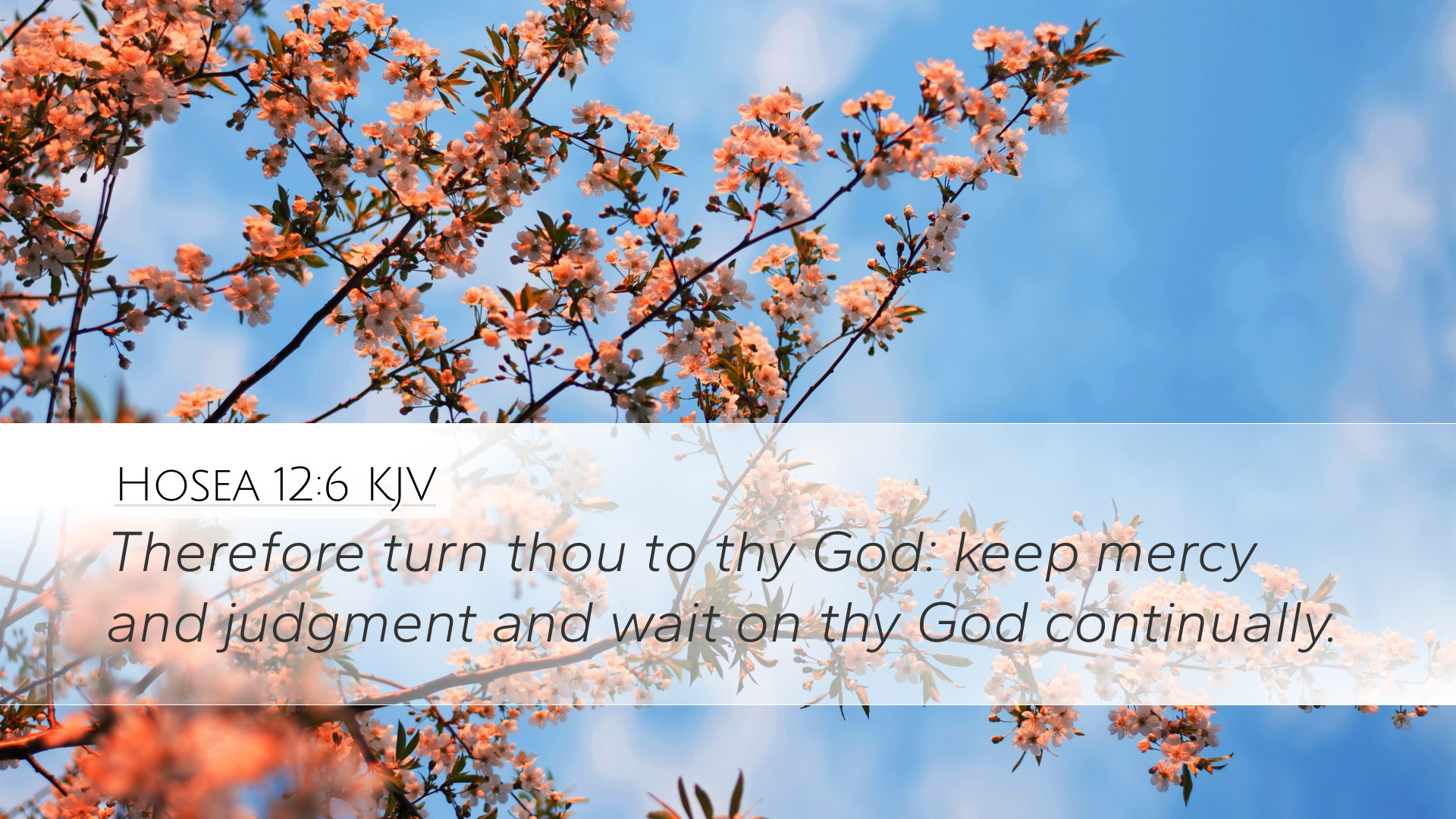Old Testament
Genesis Exodus Leviticus Numbers Deuteronomy Joshua Judges Ruth 1 Samuel 2 Samuel 1 Kings 2 Kings 1 Chronicles 2 Chronicles Ezra Nehemiah Esther Job Psalms Proverbs Ecclesiastes Song of Solomon Isaiah Jeremiah Lamentations Ezekiel Daniel Hosea Joel Amos Obadiah Jonah Micah Nahum Habakkuk Zephaniah Haggai Zechariah MalachiHosea 12:6
Hosea 12:6 KJV
Therefore turn thou to thy God: keep mercy and judgment and wait on thy God continually.
Hosea 12:6 Bible Commentary
Commentary on Hosea 12:6
Text of Hosea 12:6: "Therefore turn thou to thy God: keep mercy and judgment, and wait on thy God continually."
Introduction
The book of Hosea serves as a profound reminder of God's unwavering love and the call for repentance among His people. This verse, Hosea 12:6, encapsulates the essence of the prophet's message, directing Israel towards the paths of mercy, justice, and a steadfast relationship with God.
Overview of the Context
In the broader context of the book of Hosea, we find a narrative marked by Israel's unfaithfulness and God's enduring covenant love. Throughout the text, the themes of judgment, redemption, and the call to return are woven together. As Hosea speaks to both personal and national repentance, this particular verse stands out as a clarion call for ethical and spiritual renewal.
Verse Breakdown
The verse can be broken down into three imperative exhortations, each reflective of a transformative relationship with God:
- Turn to thy God: This phrase emphasizes the need for a conscious decision to return to God, indicative of repentance and seeking reconciliation.
- Keep mercy and judgment: This summons the people to embody the character of God through acts of mercy and just governance, essential for societal integrity.
- Wait on thy God continually: This represents a posture of hopeful anticipation and trust in God's divine timing and purposes.
Insights from Commentaries
Matthew Henry's Commentary
Matthew Henry emphasizes the holistic nature of the exhortation in Hosea 12:6. He points out that the call to "turn to thy God" signifies a profound return from spiritual waywardness. Henry notes that repentance must involve sincerity and a genuine desire to fulfill the will of God. Furthermore, he comments on the dual command to "keep mercy and judgment," which evokes the moral attributes of God and the necessity for His people to reflect them in their lives. Henry appreciates the enduring nature of God’s expectations, stating that the call to wait on God indicates a reliance on divine provision and guidance, underscoring the importance of patience in the believer's life.
Albert Barnes' Notes
Albert Barnes highlights the practical implications of each command given in this verse. He elaborates that to "turn" signifies an actual change in lifestyle and priorities, which is critical for anyone seeking a restored relationship with God. Barnes articulates the importance of "keeping mercy and judgment," suggesting that these principles are foundational for living in accordance with God's character. He accentuates that mercy should permeate human interactions while judgment pertains to the ethical decisions and policies established within the community. Barnes concludes with a strong emphasis on the continual aspect of waiting on God, which he sees as essential for spiritual vitality, as it fosters dependence on God rather than human efforts.
Adam Clarke's Commentary
Adam Clarke provides a detailed exegesis of this verse, noting the imperative nature of the verbs used. He argues that the term "turn" encompasses both an outward and inward movement, indicative of a comprehensive transformation of heart and action. Clarke points to the necessity of balancing mercy and judgment to achieve true righteousness in both personal and communal contexts. He believes waiting on God is not passive but an active engagement in faith, bringing forth the understanding that believers must cultivate a strong hope in God amidst adversities. Clarke's commentary enriches the interpretation by framing the waiting as an expression of trust in God’s promises and fidelity.
Theological Implications
Hosea 12:6 is a verse rich in theological significance, touching on the essence of repentance, moral responsibility, and the hopeful anticipation of divine intervention. For pastors and theologians, this passage serves as a critical reminder of the comprehensive nature of repentance that involves turning away from sin, embodying mercy and justice, and trusting in God’s timing for resolution and restoration.
Practical Application
The directives in Hosea 12:6 offer wisdom that transcends time, presenting opportunities for practical application in contemporary contexts:
- Church leaders are called to encourage congregants in their personal relationships with God, emphasizing the importance of turning away from unfaithfulness and sin.
- The call to "keep mercy and judgment" serves as a foundational principle in community engagement and social justice efforts, where believers may actively participate in promoting equity and kindness.
- Waiting on God invites an ethos of hope and trust in a world that often seeks immediate results. Pastors can teach on the virtues of patience and reliance on divine providence.
Conclusion
In conclusion, Hosea 12:6 challenges believers to engage in profound spiritual introspection. Through the encouragement to turn towards God, live out the principles of mercy and justice, and wait on Him continuously, this verse provides a comprehensive framework for a life marked by faithfulness and righteousness. As we reflect on these themes, may we be inspired to cultivate deeper relationships with God and embody His character in a world in desperate need of His truth and love.


